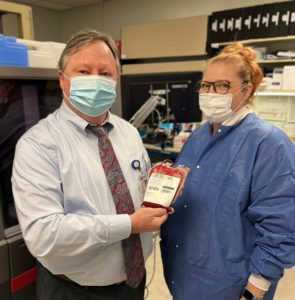
Special to Iredell Free News
Do you want to make a difference in our community? Luckily, you do not need an elaborate plan to make a positive, long-lasting impact.
You can make a life-altering difference by donating blood. You can help save three lives in less than one hour through a blood donation.
“One easy way to help others in the community and give a gift to someone who desperately needs it is to donate blood. It only costs you about one hour out of your day. It can truly save a person’s life. Not many people can say, ‘I saved a life today,’ ” said Mark Berry, director of Iredell Health System’s laboratory.
January is historically a difficult time for blood collections with increased seasonal illnesses and inclement winter weather. In 1969, January was declared National Blood Donor Month as a time to encourage donations, honor those who selflessly donate, and recognize the importance of giving blood.
The Importance of Giving Blood
Your blood keeps you alive. It delivers oxygen, fights infections, carries nutrients throughout your body, and helps your body heal. Without this very important fluid, no human can survive.
Donated blood is essential to help patients survive surgery, cancer treatment, trauma situations, and chronic illnesses. Without donors, many of these lives would be lost. In fact, every two seconds, someone in the United States needs blood.
Though blood is needed so often, only about 3 percent of eligible people donate, according to The Blood Connection, a community blood center that serves the Carolinas and Georgia. If every eligible individual donated blood just twice a year, there would never be concerns about blood supply.
“During and after the pandemic, donor participation was very low and put a strain on all hospitals and transfusion centers. The demand was constant, but the supply was low. Currently, there are now increased numbers of patients getting surgeries, and more people are back to normal life, which also means high demand for blood,” said Berry.
“Iredell has kept up with the demand and increased supply by using The Blood Connection and the American Red Cross as our blood suppliers, but there is still a shortage of some blood types. We are in need of O donors. O blood donors can be received by more recipients than other blood types,” he added.
When you make the decision to donate blood, you are helping those in your own community.
According to Berry, around 275 units of blood are used each month at Iredell Memorial Hospital, and every single unit comes from a blood donation.
“We had two blood drives in December at the hospital and had about 149 people donate. This is phenomenal, but it does not meet the need for what we give to our patients in one month. Thankfully there are donation sites and events going on every day throughout the county and state to keep up with the demand,” he said.
After a blood drive, the donated blood is sent for processing and testing. Donations are then sent back and delivered locally to assist patients in need. The laboratory at Iredell Health System is one of those locations.
“At Iredell Health System Laboratory, we follow the College of American Pathology standards and all state and federal regulations regarding the safe storage, handling, and infusion of blood,” said Berry.
The Iredell lab stores the donated blood in the blood bank, where it is available for patients when needed. However, the need for donated blood is always constant as blood can only be stored for a limited period of time.
Set a Date to Donate
When you go to give blood, you will be asked a series of screening questions about your health history. To donate, you must be at least 16 years old, weigh over 110 pounds, and be in general good health. Once you complete the medical screening, a brief physical examination will take place to measure your vitals.
If you meet all requirements, you will then sit in a comfortable chair, and the phlebotomist, a healthcare professional who is trained to draw blood, will clean the site. A needle will be inserted into your arm to draw the blood. Blood donation is very safe and does not hurt. All you should feel is a little pressure and a quick “pinprick” sensation. The actual donation only takes around 10 to 15 minutes.
After donating, you should rest for a few minutes and enjoy some refreshments. You will be able to resume normal activities within 10 to 15 minutes of donating, but you should avoid any strenuous activity immediately after donating.
You can donate blood every eight weeks.
SIGN UP TODAY
If you would like to sign-up to give blood, Iredell Health System is hosting a blood drive with The Blood Connection from 9 a.m. to 6 p.m. on Wednesday, February 8, at the hospital. To schedule your appointment, visit https://donate.thebloodconnection.org/donor/schedules/drive_schedule/196130.
You can sign-up for other community blood drives by going to redcross.org or thebloodconnection.org and clicking “donate now.”
About Iredell Health System
Iredell Health System includes Iredell Memorial Hospital; Iredell Mooresville; Iredell Home Health; Iredell Wound Care & Hyperbaric Center; Community and Corporate Wellness; Occupational Medicine; the Iredell Physician Network and more. Iredell Memorial Hospital is the largest and only nonprofit hospital in Iredell County. The comprehensive healthcare facility has 247 beds; more than 1,800 employees; and has 260 physicians representing various specialties. Centers of excellence include Women’s and Children’s; Cardiovascular; Cancer; Surgical Services and Wellness & Prevention. The Health System’s newest campus, Iredell Mooresville, is home to the area’s only 24-hour urgent care facility, as well as an ambulatory surgery center, imaging center, rehabilitation services, and physician practices. The mission of Iredell Health System is to inspire wellbeing. For a comprehensive list of services and programs, visit www.iredellhealth.org.



